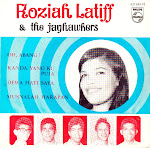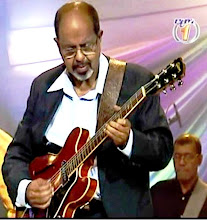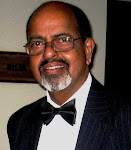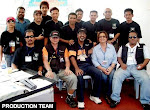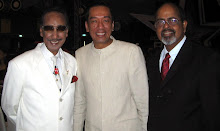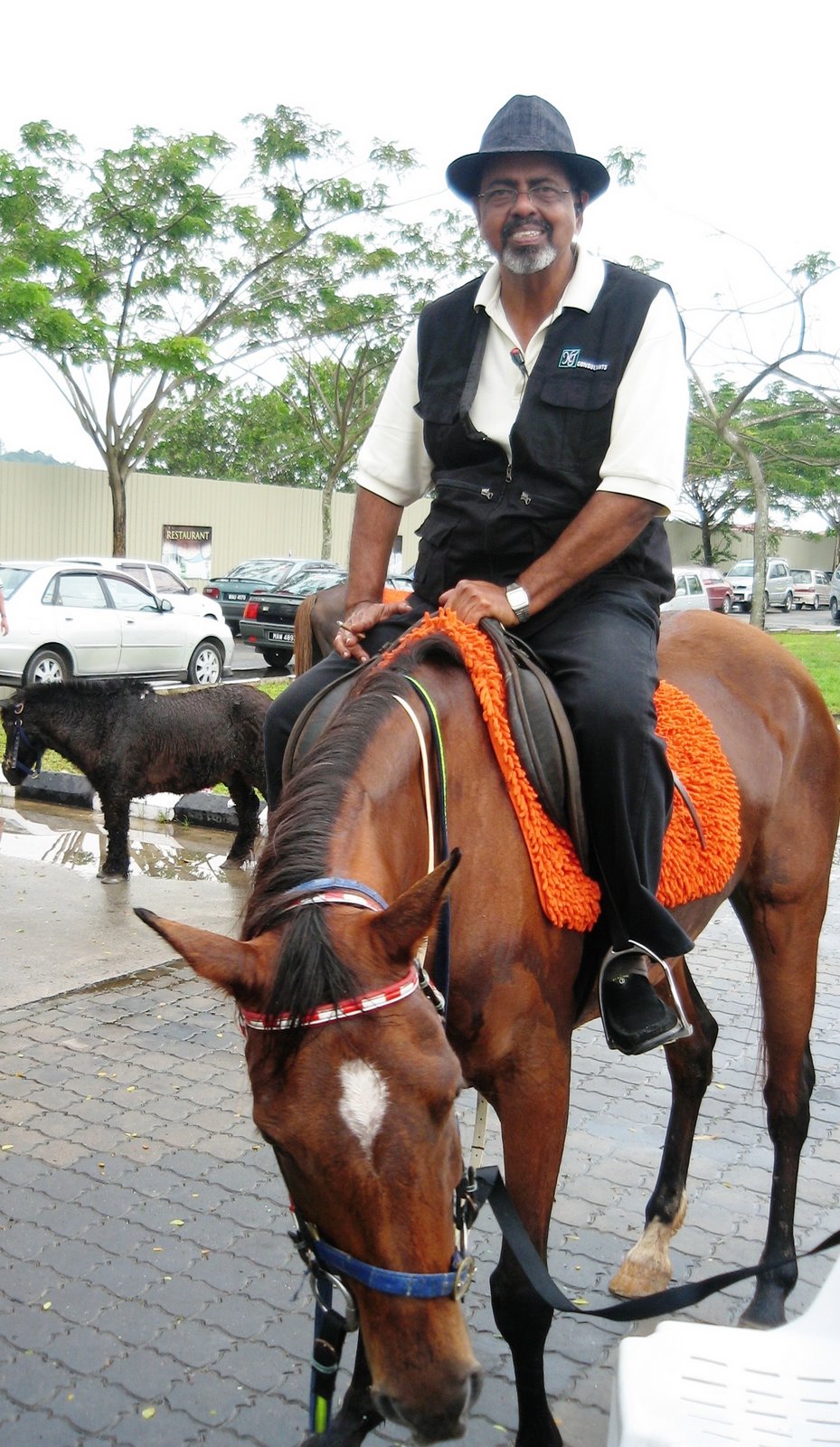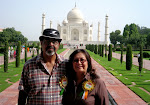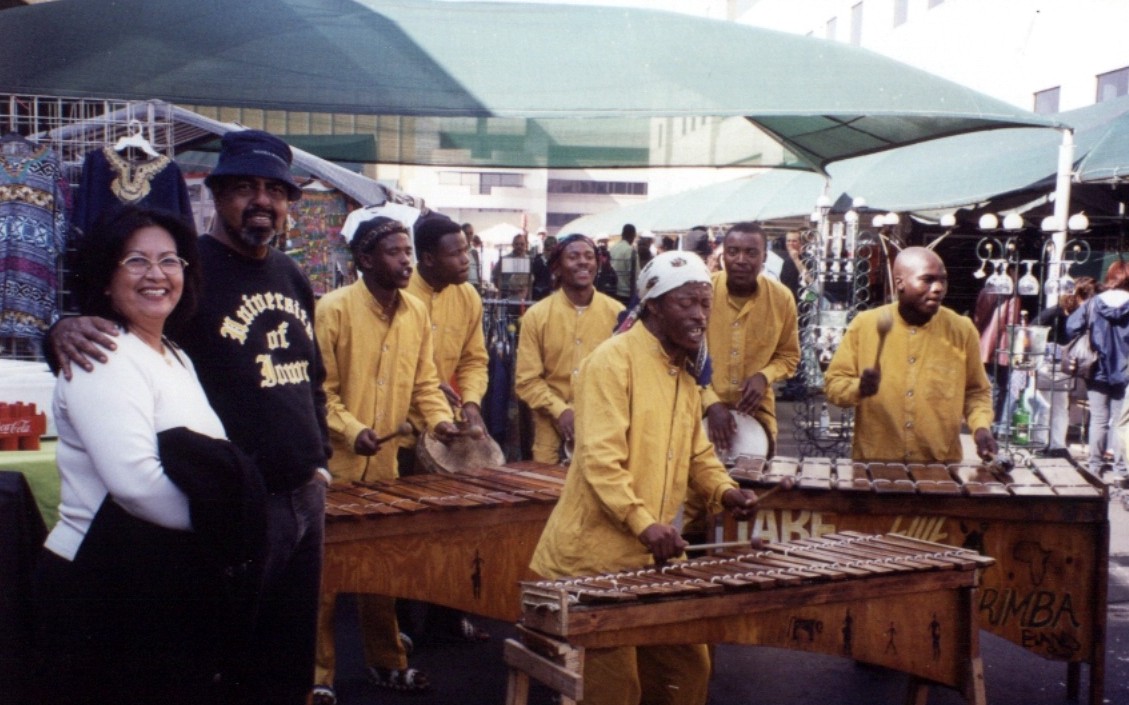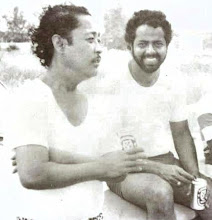
Humankind’s quest for a more democratic, just and united society has generally been an illusive one and has been an ongoing evolutionary process in just about every nation on earth since the beginning of time. Great nations and civilizations have risen and fallen in this process. The desert Arabs, for instance, built one of the greatest empires and civilization from being a mere nomadic and uncivilized race. This too waned away due to in-fighting, intrigues, nepotism, corruption and cronyism. We can and should learn from History as it illustrates that such falls from grace have occurred repeatedly all over the world. The Indus Valley Civilizations of Harappa and Mohenjodaro, Egypt, Babylonia, Phoenicia, Greece, Rome, Persia are such examples. The election of a black African-American President is a more recent example of this evolutionary process in the USA. Malaysia enjoys a much shorter period in history but, the expectations and hopes of her people ride high. Malaysians have to be a little more patient in this matter.
The shrinking global village, advanced media access and better literacy, among others, have accelerated this general sense of dissatisfaction today. Many of our senior citizens strongly believe that we were moving forward but somewhere we must have strayed from our cherished values, goals and path of our founding fathers. In the first twenty years of Merdeka, we were growing strong in many areas – education with a strong base in English medium schools, sports, infrastructure, agriculture and industry. The 1963 song “Berjaya” has lyrics that proclaim “Malaysia kita sudah berjaya, Aman makmur bahagia…….Satu bangsa dan satu negara” and so on. It was proudly sung by Malaysians of all races and creeds in the early days who believed the lyrics to be true. Seen retrospectively, it was a mere campaign song that rallied people to unite as we were almost at war with Indonesia at the time. Today, the generally more educated Malaysian is taking stock on how “berjaya”, “bahagia” and how much of “satu bangsa dan satu Negara” we actually have become.
Today, many issues are seen to be fast eroding the fine balance of peace and harmony built amongst the peoples of Malaysia, both in East and West Malaysia. In all my years at school and also in my thirty six years of teaching experience, I had never heard of words like “racial divide”, “Malay supremacy”, “cronyism” and “social contract”. These highly charged political words have suddenly popped up from teh-tarik stalls to the Parliament. Such unpleasant words upset both non-Malays and Malays alike albeit in different ways and levels. This is definitely not good and must be tackled quickly and efficiently. The pangolin-like curling up into a state of absolute denial by our ruling elites is equally bad and hardly the right reaction to solve the current levels of widespread dissatisfaction.
THE MAIN PROBLEMS
A prominent blogger has outlined his top ten problems facing Malaysia currently which we may not all agree upon completely. Nevertheless, he contends that if we can solve just the top three, the other problems will then automatically be resolved. They are, in his order of priority:
1. Violation of the Constitution.
2. Erosion of the independence of the four branches of government.
3. Arrogance of those in power.
4. Denial of the fundamental rights of the citizens.
5. Corruption.
6. Mismanagement of the nation’s coffer.
7. Unequal representation of the people.
8. Lack of understanding of the nation’s history.
9. Distorting of information.
10. Poor education system.
It is my view that the non-Malays in Malaysia have never questioned the special position of the Malays, the Malay rulers, Islam or the Malay language. In return, the Malays too have not questioned the citizenship and the freedom and rights of religious worship and study of vernacular languages. Anyone who questions these things disrupts the nation’s foundations that are clearly enshrined in the constitution and can be charges under the Sedition Act.
The ISA was formulated by the British during the period of communist insurgency known as the Emergency to deal with communist terrorists and sympathizers because nailing them with hard evidence according to the law was extremely difficult. It was also used later during the Indonesian Confrontation and it served well during such times. The ISA allows the authorities to arrest and hold anyone captive without him/her being charged in court or following the due processes that the law allows. Many Malaysians keep saying that the (ISA) is irrelevant and redundant today as the emergency periods mentioned above are now history. Moreover, it is contended that there are already enough other laws to contain any threat to society and that the time is right for the ISA to be abolished. Recent use of the ISA has convinced many Malaysians that any perceived threat has not been so much to national security but rather to certain privileged people who walk the corridors of power and who are free to invoke the ISA at will. The ISA can remain but must be used only for its original purpose that is on terrorists per se.
The mainstream conventional media is mostly owned by or closely affiliated to BN parties and is accused of being used to cover up and camouflage many misdeeds and thereby disinform and misinform the Malaysian public who still read the newspapers as though it is the gospel truth. Investigative journalism is rare in Malaysia. The press is free but only to certain extent. But with the easy access and availability of uncensored alternative news and reports through the internet, more and more people have become less susceptible to governmental propaganda. They have resultantly begun to question the validity of newspapers and the broadcasting and print media reports. Some have simply stopped buying newspapers and read the news through the internet for free. So Malaysians now have begun to question many things. For example, the Law Minister proclaimed in Parliament recently that the police act fairly with all persons or parties without double standards. But what the rakyat has observed has been quite different.
Peaceful demonstrations including candle-light vigils and marches are not a security threat although the authorities view them as such. They are legitimate shows of political or non-political dissidence in a democratic society which is indeed allowed for in our Constitution. The police should monitor the situation, provide escort, protect the demonstrators and control the traffic instead of using water canons and tear gas against peaceful demonstrators. People then begin to question why is it that more vocal and peace disrupting demonstrations by certain other groups aligned to the BN are left alone. Can this be seen as being fair? Why are not police permits given without bias or favor? When the UMNO Youth recently demonstrated in front of the US Embassy without any permit it was done without a permit. The demonstrators were left alone. The recent Pewaris demonstration in front of a police station is another shocking example of double standards denied by the Law Minister.
POOR EDUCATION SYSTEM
I have witnessed the gradual deterioration of our education system since the early 1970’s. Many will disagree with me on this statement but maybe not if you were schooled in Malaysian English medium schools through the 1970’s. Dato Seri Hishamuddin, our Minister of Education, must surely be one to disagree for he has proclaimed that in the context of our achievements vis-à-vis the other Commonwealth countries we are tops. It is indeed heartening to note that our education system ranks very high in key indicators among our peers who share the same legacy and colonial past. My question is why are we comparing ourselves with other Commonwealth countries like Pakistan or Uganda and not with Singapore, Canada or Australia? Are we satisfied by being merely the best among the worst?
Lately, even the famous Al-Azhar University has cancelled its MOUs with eighteen local colleges for consistent poor performance by Malaysian students sent there. The Hon. Minister for Higher Education has said that the government was in no position to negotiate with this prestigious university and even tried to politicize the issue. His statement also subtly implied that such things could be “selesai” over here. Admittedly, the availability of education at all levels in Malaysia has grown tremendously. However, it is regrettable that the quality factor has been compromised at the expense of quantity. The perceived need to produce a technological brand of human resource capital seems to have also been done at the expense of the humanities subjects. What we may achieve at best is to produce a pool of robotic- minded graduating students void of cultural and humanistic values.
Malaysia shifted slowly from English to Malay as the language of instruction in 1970s. It is my contention that the introduction of Malay medium schools in the 1970’s was a principal cause for the deterioration of the education system. In itself, it was a good move to give an alternative for those parents wanting their children to be schooled entirely in the Malay language at the secondary level. But the problem was that it was done at the expense of eradicating the primary and secondary English medium schools completely. One must remember that such developments took place almost immediately after the infamous May 13 incidents when misplaced nationalistic sentiments and highly charges emotions rode high in charting the country’s future.
The universities are still producing such graduates who don’t make the grade in the workforce and have become largely unemployable. The glut of graduates was confirmed in 2005, when the government’s Economic Planning Unit asked the unemployed to register for a survey to gauge who was out of work and why. Nearly 60,000 jobless grads — equivalent to a quarter of those who finished their higher education— signed up. In a country with 237,000 job vacancies, about 45,000 college grads are unemployed, mainly because of poor English according to the government itself and Rafiah Salim, the Vice chancellor at University Malaya which is the country’s oldest university. She says that the only “industry” that’s really using Bahasa Melayu is the government service.
Curriculum meddling that began in the 1970s has eroded the good system that we already had in the earlier days. We tried to reinvent the bicycle. Professor Emeritus Khoo Kay Khim of UM has compared our present curriculum to a “torn and tattered coat” that has been cut, mended and re-mended beyond recognition and what was needed now was an entirely “new coat”. There was also a sensible balance between the sciences and the arts in much earlier times. History and Geography were replaced and Art & Craft also thrown out. The science subjects were given undue prominence at the expense of the arts. History is still being taught to arts students but many university graduates do not seem to know who Hitler or Winston Churchill was.
A more recent example of bad curriculum meddling was reported in (STAR - 11.12.08). It reported that the Education Ministry will carefully study the facts and information to be entered into history textbooks to instill patriotism among the young generation. In announcing this, the Education Minister Datuk Seri Hishammuddin Tun Hussein said that the step was among the ministry's efforts to change the education curriculum at the primary school level by having history as a special subject by 2010. While the idea to teach History again from the primary school level is to be welcomed the reason given again is shallow and shows again how we miss the point – the learning of History in this case. The Minister was reported as saying that what was important were values like patriotism, loving the country, comprehend the sacrifice of national heroes and understanding that the present state of the country did not come about just by being still but through blood and sweat. The learning of History must be a holistic experience and not based merely on such narrow parameters alone. Our curriculum planners, perhaps themselves victims of the current education system, have not read that Goethe, the famous 19th century philosopher and writer, has said that “patriotism ruins history”. Gerda Lerner the world famous historian says:
“We can learn from history how past generations thought and acted, how they responded to the demands of their time and how they solved their problems. We can learn by analogy, not by example, for our circumstances will always be different than theirs were. The main thing history can teach us is that human actions have consequences and that certain choices, once made, can not be undone. They foreclose the possibility of making other choices and thus they determine future events.”
The assassination of British Resident James Birch by Dato Maharaja Lela is one good example. He is seen as a patriot but was he right in what he did? Should we follow his example and allow assassinations of people in authority today following his precedent? Then again there is the case of Hang Tuah killing his best friend Hang Jebat which is projected as a good portrayal of loyalty to king. What are the morals behind these examples?
The syllabus for English was watered down at all levels and English Literature with in the early 1970’s. A direct result manifested itself in the form of falling academic standards at the universities. Today, school children lack any interest in divergent thinking which is almost always discouraged. They are instead advised to memorize and regurgitate facts in the final examinations to ensure better grades even at the tertiary levels. As such, general knowledge is at an abominable level among our students today.
When we started new universities we had needed good lecturers, professors, faculty heads and deans literally overnight. To solve the problem, we did an “Idi Amin” and placed very junior educators who have had no more than a year's experience or so after getting their M.A., or PhDs. to fill such positions. Many such educators were indeed educated in UK and the USA but many of these government sponsored scholars had also enrolled in sub-standard universities there as it was easier to get admissions at such places with lower entry requirements. When such “graduates” returned no one questioned the value of their credentials and transcripts nor their academic prowess. Thus it is hardly surprising that we also have quite a few Malaysian professors, Deans and Vice Chancellors who are not as proficient in English and shy away from research. What we had needed were experienced and respected professors who could inspire students with their knowledge and research. We should have brought in expatriate help. Perhaps it’s still not too late to do so would just be wishful thinking at this stage. Many local professors and UMNO Youth would probably literally run amok against such ideas to improve our education.
Education is a life long experience. Schools should do more than simply transmit knowledge from one generation to another. Students must learn things that are not actually taught in the formal curriculum indirectly. It is an entire range of educational experiences promoted by schools and teachers through practices that are not necessarily written down. A proper education that enriches young ones with knowledge and meaningful experiences is the most important function of education but unfortunately our education system fails such a test. Malaysians just seem to have forgotten the difference between a good education and good results. According to Al-Farabi, the whole activity of education is the acquisition of values, knowledge and practical skills leading to perfection and the attainment of happiness. The many education ministers that came and went had not looked too deeply into this aspect.
Research, the hallmark of a good university, is also sorely lacking at our local universities who are all geared up more just to churn out graduates. Even the Rubber Research Institute of Malaysia (RRI), a non-educational entity per se, is better known and respected worldwide for its research than any of our local universities. The Ministry of Education too has a research division since 1963 – The Educational Planning and Research Division (EPRD) which plans and manages activities towards developing the education system in the country. This agency can therefore be also held responsible for any decline in education standards in Malaysia. It is also strange that we do not know of any research from EPRD that makes it to the public domain?
Malaysian policy makers tend to ignore the fact that that the language of the letters and sciences has been English for some centuries now. Dr. Mahatir belatedly and unsuccessfully did try to stress on its importance about a decade ago. However, burning nationalism amongst his peers overshadowed his efforts. In the heydays of the Arab civilization, for instance, Arabs had no qualms about mastering Greek which was the dominant language of learning of the times. They even improved upon and corrected the mistakes of the earlier Greek and Indian civilizations. Such was their quest for the mastery of knowledge that it overshadowed any other narrow parochial concerns such as language. Moreover they never branded Greek knowledge as un-Islamic. Knowledge is not bound by or subservient to any religion.
Today, USA is the current leader in almost all fields in the arts and sciences. Japan learnt from USA way back in the early 20th century and built up its technology and even managed to engage and win battles in WW II using the same technology learnt in English from the West. These days Japan competes on par with USA and the Western powers. India has a culture going back 5,000 years but English has never been compromised or viewed as a threat to their hundreds of languages that are still very prevalent there. As a result, Indian technocrats schooled in English are highly respected worldwide today, including the USA.
If we are really keen to outshine others in the challenging global village of today, we must bring back English to its former status in Malaysia. Even the serving British colonials were respectful of our linguistic prowess in English in the 1960’s. So the English medium schools should be brought back to the fold once again. Such schools should be made an option for every parent. Today, many wealthier Malaysians including BN politicians send their children to international schools where they study in English. It is an option that is clearly denied to the bulk of our society. This is grossly unfair to parents who now miss out on this option of sending their children to English medium schools that was possible in earlier days.
It has become pathetic to see our students and their professors and teachers conversing in substandard language, be it in Bahasa Malaysia or English. Our education system must be looked into in depth to elevate the level of our standards to be on a par with First World countries. We should look at first world countries as role models. In Finland, for example, the underlying principle is that education is the key to economic survival. And Finland has the best literacy rate in the world. Here we should be bold enough to embrace English as the second official language of the country. Hong Kong and Singapore are nations trying to keep abreast with the rest of the world by still using English in their schools. It is seen as a basic tool in trade, commerce and the sciences. The recent call for a single type of schooling system is good except that the medium of instruction should be in the English language and not in Malay. Malay, Tamil and Chinese medium schools are not necessary anymore although the right to learn one’s own vernacular mother tongue, which is enshrined in our constitution, should not be compromised in such newly envisioned school. But it would still be better to to revert to the old system of having four types of schools – one for each language (Malay, English, Chinese and Tamil). This idea will be better supported by all Malaysians. Each type of school must have Bahasa Malaysia as a compulsory subject as it is the national language.
All schools should also provide free transport for students to and from schools. Free quality meals must be served for all pupils at primary and secondary levels with no more of the periodic food poisoning cases that we hear of so much today. Food poisoning in school canteens was unheard of in the earlier times when they were run mostly by Chinese operators. Hostel facilities must be provided for all deserving children irrespective of race. Such was the case at my alma mater the High School in Muar. It also housed Indian and Chinese boys besides Malays from the rural areas and estates in the hostel. We lived alongside the kampong boys from Grisek, Bukit Gambir, Parit Jawa and so on in the 1950’s and 1960’s. If not for this single benefit of multi-racial hostel life, in all probability, we would have ended up as drivers or laborers. All the Indians from the Muar High School hostel went on to be college professors, teachers, police superintendents and doctors because of this single break accorded to us.
The truth is that quality education does not come cheap. Generous and well-managed funding should result in Malaysia’s success in truly arriving at quality education. If a nation’s wealth is in its human capital, then we should maximize its potential to the hilt with not cut in costs. The added funds can come from cuts on our military spending for it appears unlikely that we will be attacked by any of our neighbors. The recent costly purchase of submarines and jet fighters is a case in point. Even if there is any such external aggression, The Five Power Defence Arrangements (FPDA) between the United Kingdom, Australia, New Zealand, Malaysia and Singapore signed in 1971 would be there as a deterrent. The arrangements are still in place. Many of us seem to have forgotten that such security arrangements made by our forefathers do indeed exist.
THE SOCIO ECONOMIC STATUS (SES) FACTOR
I would say that another major problem in Malaysia today stems from the economic imbalances in society especially between its Bumiputra and non-Bumiputra divides. It is also dangerously and increasingly being seen from a David-Goliath perspective with terms like “Malay supremacy” being thrown in. Ironically, both sides see themselves as victims of the prevailing system which is seen to favor the Malays. But, to be fair, the National Economic Policy (NEP) has generally benefited all Malaysians. It can be easily seen that the general standard of living in Malaysia (with exceptions in East Malaysia and some other rural areas) is no where near the conditions under which our forefathers had lived and worked under especially in towns, kampongs, new villages, estates, mines, ports and in the public works departments. Today, almost all Malaysians enjoy the many improvements in the physical aspects of their lives – the more than enough food, modern homes and sanitation, better infrastructure, utilities, transport, facilities and healthcare, stronger economic fundamentals, the bountiful lush green surroundings, the many natural resources and so on. Last but not least, we must not forget the peace that we are enjoying now since the days of the Emergency and Indonesian Confrontation. Yes, we are a blessed nation with many natural resources. Yes, we are rich. There is enough food on the table for everyone. Yes, we can also afford to hire more than 2 million foreign workers over here to do our “dirty” jobs. But why then are we still dissatisfied?
Dissatisfaction can be seen as a human virtue and can manifest itself through any facet of our life. It is also relative to time, space and demograpy. The one key factor that rises above all others, to my mind, is the socio-economic-status (SES) of a person that decides where you live, what you eat, what you can afford to buy - in short what power you have in society. It is SES that stratifies society into the privileged and less privileged segments. Yes it’s all about SES or the lack of it which brings me to my next point. It is also about how much of such resultant power one has in society.
If one belongs to or is well-connected to the powerful segments of society, he/she is of course happy and wishes to maintain the status quo and keep benefiting from this sort of association. If a Rama can make a phone call to a police officer and get his traffic offence squashed, he is already connected to power in society although in a very small way. Similarly, if Lee could see an education officer and “fix” his son’s posting to a preferred town school he feels good. If Rahman gets to see a politician and obtain a scholarship for his daughter, he too feels good. But the same Ramas, Lees and Rahmans, will take to the streets and protest over the abuse of power and cronyism. The similitude is that of a person caught in a traffic jam cursing wildly about the mess not realizing that he/she is also part of the cause for the jam. It is all about levels of power one wields.
It is usually also the powerless segments of society, regardless of race, that whines and resultantly tends to manifest this frustration through legal as well as illegal means. We are yet to see, God forbid, any kinds of violence and social unrest on a scale seen in some other countries like Uganda, Pakistan or Thailand. Lately, we have also seen vociferous expressions of injustice locally through protest gatherings and marches which is then responded by opposing parties with well-orchestrated primordial posturing and chest beating, gate-crashing, kris-wielding, effigy burning and so on. Dissent and tension affects both sides of the divide. Such behaviors have all the makings for the disruption of the prevailing peace. The police then rightfully move in and do their bit to prevent any perceived disruption of civil order but it is often done in a partisan way. The police should act to prevent any social disruption but should do so without fear or favor in a professional and non-partisan way. Pro-government groups, usually Malay, who resort to the same sort of things without any official permit, are left alone. This is grossly unfair can only breed more dissatisfaction amongst the people and disrespect for the police force.
The National Economic Policy (NEP) is supposed to cut across race and eradicate poverty. It would be wrong to say that the NEP has not addressed poverty completely although there are still many claims to the contrary. The dissatisfaction stems more from the implementation process rather policies per se especially with regards to the sharing of the national pie. To be fair, the ruling Barisan Nasional party (BN) has always given special treatment in many tangible forms (giving blue chip shares, land etc) to minorities. For example, the minority Indian community in Malaysia did receive much governmental aid but they did not trickle down to the grassroots having been siphoned off and “hijacked” by the very same Indian leaders whom the government recognizes as representing the Indians. So Indians, especially in the lower rungs of the SES, have become angry with the government and indirectly with Malays too as they are seen to be the only ones solely benefiting from the government. Statistics show that until the recent polls in March, Indians had always voted for the BN.
CORRUPTION
BN leaders, especially since the Mahatir years, had been increasingly insensitive to the signs of growing frustration from both Malays and non-Malays who complain about the bad implementation of affirmative action policies, increasing cronyism and preferential treatment for select Malay and non-Malay BN friendly people only. They have also, either knowingly or unknowingly, ignored the growing dissent and started reacting with a state of high denial much akin to an ostrich burying its head in sand when confronted with an adversity. Some have become plainly arrogant and behave as if they are God’s gift to Malaysia and are indispensable. Many are haughty and unwilling to give up power to build up a younger leadership base. They need to be reminded that the graveyards are full of indispensable people since the beginning of time.
Corrupt political leaders are to be found amongst all ethnic groups in Malaysia without exception. People see this clearly. Ask any drain sweeper. Some with even criminal offences had never been found guilty as they have never been charged in Malaysian courts in the first place. The Biro Pencegah Rasuah (BPR) which is the anti-corruption agency in Malaysia has to get the PM’s nod before it can act with tenacity against the well-connected. Therefore, it has been forced to remain at best a toothless tiger that picks on small and unconnected fry to justify its name and existence. For example, how does then one account for an ex-Menteri Besar carrying millions in solid cash to a foreign country and getting caught at that and still holding on to a top post in UMNO. Even an uneducated laborer knows that it is an offence to take more than RM 10,000 in cash out of the country without official approval. Why has this particular senior politician not been charged for this offence till now? And how does one account for an ex- railway gate keeper turned politician building a mansion that would shame a king. There is still much furor regarding the non-transparent and indiscriminate way of giving away Approved Permits (AP) to import tax-rebated foreign cars. Such glaring irregularities have irked both Malay and non-Malay Malaysians to the hilt. One famous Malaysian politician called this “memperbodohkan rakyat” which means making the people stupid or silly.
THE RACIAL DIVIDE: WHO IS MALAY?
As education sieves into more levels of society, even the definition for Malay or Bumiputra and the very concept of Malayness is now being questioned by the non-Malays and Malays alike. This is actually quite unnecessary polemics. The English just called the Malays Malay. The Sanskrit rooted term “Bumiputra” is something the British did not pass on to Malaysians when they left. This single word that appeared after Merdeka has created an unprecedented divide amongst Malaysians. Malays feel superior and the non-Malays feel inferior. This word should be thrown out.
Ethnicity is never going to be the same as nationality. Neither is religion. One Hj. Mokhtar Stork wrote in a local newspaper that Malays just want to retain Malaysia’s Malayness. He is of the view that people in this country need to understand that Malaysia is a Malay/Bumiputra country. Why one would ask? Is that not already indicated in the name Malaysia itself? He then claims it’s just like the English, Scots, Irish, and Welsh in the United Kingdom retaining their identities in spite of their British-ness. They defended their identity in spite of the presence of millions of others. As such, he concludes that Malaysia as an indigenous country that must retain Malay-ness and not Chinese-ness or Indian-ness. For argument’s sake, Stork’s contention that there is indeed an ethnic entity called Malay is flawed from an anthropological angle. There are several books on this topic which reflect upon the prevailing anthropologists’ views that there is no such race as “Malay” to begin with. Anthropological writings claim that people have migrated to this region from a very long time ago.
Malays themselves seldom refer to themselves as Malays. Aborigines do not call themselves Malay either. Malays who live on the West Coast of Johor would rather be called Javanese and those from the west coast Kedah would prefer to be known as Achinese. Those from Selangor and Perak prefer to retain their Bugis or Minangkabaus tags. The Ibans simply want to be known as Ibans. A Kelabit would also be uncomfortable being referred to as Malay. The aboriginal Negritos have more in common with Africans. At best then, Malays can be taken as an aggregation of people of different ethnic backgrounds but who speak the same language or family of languages and share common cultural and traditional ties. Of course we must not also forget the descendants of Indian Muslims who had married local women and who are accepted as Malays. The non-Muslim Portuguese Eurasians too have also been accorded the Bumiputra status lately as they are descendants of Malay women who married Portuguese men in the 16th century. Then there are also the Baba Nyonyas and Melaka Chettiars communities who although are classified as non-Muslim, habitually lead a Malay way of life and have been here since the times of the Melaka Sultanate. But they do not call themselves Malay either just like the Indians in India who seldom refer to themselves as Indians but by the name of the hundreds of sub-cultures and castes extant there.
Knowing our roots is important but this sort of ethnic sorting exercise is outdated and would get us nowhere today. What matters is the simple truth that today, we are all here as a diverse grouping of peoples who differ by ethnicity color and creed but share an unique blend of a melting pot type of culture which we can call Malaysian. Should we all not be thinking and working towards a new label then as we evolve – a Bangsa Malaysia? That’s what we are and have become –Malaysians.
THE SOCIAL CONTRACT – IS THERE ONE?
The Malay and non-Malay polemics, which is basically all about special quotas, equities and privileges for the Malays, brings me to my next point which is the social contract – another relatively new term and unpleasant we hear much these days. In fact, there was nothing of the sort in the pre and early Merdeka days. It is an entirely new concoction. To the best of my knowledge, there was agreement between the Malays and non-Malays of the time that those born in Malaysia after Merdeka would be given Malayan citizenship and would be free and allowed to practice and learn their respective religions and languages. In return, non- Malays were to recognize the special position of the Malays, the Malay rulers, the Malay language and recognize Islam as the official religion of the state. This agreement was then sanctioned by the British who gave us independence and is already enshrined in the constitution which remains undisputed and should remain so. As I have mentioned earlier, I reiterate that Malaysian Malays and non-Malays have never questioned any such “original” constitutional provisions. At best, the social contract was an unwritten understanding and agreement that was interpreted by the British and enshrined in our Constitution which all parties then agreed to.
But political leaders politicize this issue and ride high on this wave and add more fuel to the fire in the process. One official agency that has been fuelling hatred amongst Malays towards non-Malays is the Biro Tata Negara (BTN). Since BTN’s formation in 1974 it is alleged that this institution has been unrelentingly and unashamedly planting racist poison among government servants, PTD scholars, university students and youths to destroy the public policy of creating a Bangsa Malaysia out of the diverse mix of peoples. This sort of “brainwashing” of the budding and young Malay leaders students for more than a quarter of a century is not going to bring us anywhere towards a united Malaysian nation. In this way, the BTN directly undermines the work of The National Unity Council, The National Consultative Council and the Ministry of Unity, Culture, Arts and Heritage. Some large majority Malay schools too have echoed similar anti non- Malay sentiments to their students. In return, non-Malays then feed an equally potent form of hate for Malays to their children at home. All this has to stop. It is high time for BTN to be abolished as it has no place in Malaysia’s future today.
While on this point, I must comment on the Friday sermons in the mosques that also sometimes are used to kindle hatred for non-Muslims. The Holy Quran addresses the whole of mankind when it states in Verse (49:13) :
“O mankind! We created you from a single (pair) of a male and a female, and made you into nations and tribes, that ye may know each other (not that ye may despise each other). Verily the most honored of you in the sight of Allah is (he who is) the most righteous of you. And Allah has full knowledge and is well acquainted (with all things).”
As in the cases mentioned above, the younger generation of Malaysians, both Malays and non-Malays, are misled into wrong avenues and fed with misconceptions and given wrong ideas. But it’s natural for people to react to what they see in their own time. It has provoked the young needlessly. Such things have generated meaningless argument over words that the founding fathers never even thought of. In such a scenario then, the younger ones then begin to argue and question that if a person is not a party to a contract can he/she be bound by it. They may then also begin to question why they should abide to a verbal “contract” made by their parents and/or grandparents and wonder how long will this “contract” run? Will Indians and Chinese 1000 years from now still be made to abide to a verbal “contract” made in 1957?
Non-Malays are now also questioning how Indonesians who migrated to this country just a few years ago are regarded as Bumiputra and enjoy the same special rights in the Constitution put in place for the Malays of Malaya and the ethnic Sarawakians and Sabahans. Yes, Article 153 accords Malays certain rights and privileges. But that same Article, and Article 8, does not allow imposing of quotas and permits which deny Indians and Chinese their rights in favour of the Malays. Many forget that the New Economic Policy is a two-pronged attack on eradicating poverty which is also about reducing the gap between the rich and the poor, regardless of race.
When we talk about the poor Malay farmers and fisherman we do not seem to realize that there are poor Chinese farmers and fishermen as well. Poverty does not recognize race. This is what irks many Malaysians. These days even Malays are disagreeing with the government’s policies especially in race relations and the implementation of the National Economic Policy which replaced the former New Economic Policy. Former de facto Law Minister Datuk Zaid Ibrahim is one such person. Zaid pointed out recently that the Malay supremacy concept had failed and distracted from the real issues confronting the country.
Such questions and issues can then generate much unwanted animosity, attention and response. The rights of both the Malays and the non-Malays are clearly spelt out in the Malaysian constitution. It is a written one and not a verbal one. Let’s just abide by it without any unnecessary tampering of the Constitution. Let us just live by the Constitution to the word.
CRONYISM
This is another relatively new word that Malaysians translate as political favoritism. According to the Wikipedia, cronyism is “partiality to long-standing friends, especially by appointing them to positions of authority, regardless of their qualifications. Hence, cronyism is contrary in practice and principle to meritocracy.” In the Malaysian context, it seems to have wider implications that include immunity from being prosecuted for politically well-connected Malaysians.
Cronyism is a big problem in Malaysia today. It is seen as the root of many things going wrong in Malaysia. At the macro level the, over-populating of Malays in the civil service is seen as a form of extended racial cronyism which should be brought to levels that at least reflect the racial mix in the country. In 1980, the government, faced with a pressing need for employment creation, launched a massive recruitment in the public service called Operasi Penuh. Since 1979, there were 880,000 public sector employees. There were 1.12 million government employees after Operasi Isi Penuh was conducted. Strangely, non-bumiputeras were generally bypassed in this exercise not even on a quota basis.
At the micro level, Malay senior officials in the government rise in rank through cronyism and another phenomenon called “ampu bodek” which means “boot licking” in English. Merit is seldom applied. Lucrative commercial contracts are awarded to Malays (and some non-Malays) based on such cronyism and boot-licking practices besides the Bumiputra label. There has to be a fairer mix of Malaysians in all fields – the public services, education, the military and police which is currently overtly imbalanced in favor of the Malays. In the 1950’s and 1960’s Indians monopolized the civil service, estates, railways, the utility boards and the ports. The situation was that these sectors became a little India of sorts then and it suited the British. Of course this is not right and no longer true today. The situation was not only corrected but over-corrected with the balance in favor of the Malays now. It calls for a re-correction. A system that invokes an intake quote based on the racial composition of the country would be good.
There is also a Chinese cronyism of sorts in the business world. It is a racial one much aided by conventional guilds and associations. Chinese are thus still much in control of the economic pie either directly or sometimes indirectly through Ali Baba arrangements with Bumiputra contractors. MARA, for instance, has not been able to bring about Malays to have even a reasonable piece of cake in the building industry’s supply chain. Chinese still monopolize many businesses - beauty parlors, entertainment, motor repairs and spare-parts supply, heavy industry and construction supplies, household furnishings, vegetable trading and growing, rental of heavy machinery, fresh flower trade, used car businesses, property ownership and financial institutions. This situation helps them to thrive very well. Employment in such fields too is almost entirely Chinese. This kind of Chinese monopoly is not much talked about. No doubt that Chinese carry on such businesses lucratively with real hard work and financial prudence which the Indians and Malays are generally seen to be lacking in. The non-Chinese should emulate such work ethics. There is no need to look to Japan for it.
Thus cronyism at both the micro and macro levels has to be addressed. There has to be meritocracy with a measure of control over racial dominance of any one sector. This is not going to be easy but a start has to be made. People can see this sort of dominance by job factor but it is much harder to make every Malaysian realize that there is nothing short of “blood, sweat and tears” for true success in economics and other endeavors in life.
MALAY SUPREMACY
Affirmative action for the indigenous Malays was first initiated by the British themselves. Yes, the British colonials not the Malays themselves. It has ensured that Malays did not suffer the same fate as that of the Red Indians in USA or the Australian aborigines. Today we have coined a new term which refers to the results of such affirmative action by the colonial British - “Malay supremacy”. Most Malaysians today are unaware of this British deed let alone understand it. It is all there and historically recorded. The setting up of special elite Malay institutions such as The Malay College Kuala Kangsar 1905, Malay Girls College/TKC in 1947, Sultan Idris Training College SITC in 1922), The Malay Regiment in 1933 and The Malay Administrative Service in 1909 were part this clever design initiated over a period of time. It paved the way for Malays to play the leading role in the administration of Malaya and later on, Malaysia. The British also gave prominence and dominance to Malay military power through the creation of The Malay Regiment so that the “power of the gun” would perpetually be in the hands of the Malays when they left. That is why our police force, then and now, is also predominantly Malay dominated. Even the Japanese continued this policy with a strong mistrust of the non-Malays particularly the Chinese whom they hated. When the Chinese dominated Malayan Communist Party and went underground, the British recruited many Chinese into the Special Branch to fight this insurgency as double agents and penetrate the communist cells. This effort proved to be highly successful.
It is because of the early affirmative action initiative of the British for the Malays that only Malays have served as Settlement Officers, District Officers and held higher up administrative posts such as State Secretaries, State Financial & Legal Officers when the British left. Today almost all the top brass serving in the police force and armed forces are also Malays too.
The British initiated plan thus ensured that Malays would perpetuate and dominate the civil administration and armed personnel in Malaysia eventually when they left. Protection of Malay rights, privileges, institutions, land and customs are all enshrined in the Constitution and laws (Civil and Islamic) of Malaysia. Parliamentary constituencies were also created from pre-Merdeka times to numerically favor the Malays “democratically”. For example, a clearly Malay majority constituency with less than 10,000 voters would have one representative in Parliament whereas a non-Malay majority constituency with about 100,000 voters would also have only one parliamentary representative. So Malays should actually be grateful to the British for their special position enjoyed till today especially in relation to the Royalty, Scholarships, Politics, Armed Forces, Police , Civil Administration since pre-Merdeka times to ensure that Malays would remain and reign supreme even after they left which they did completely in 1969. The British truly believed all along that this land belonged to the Malays.
To change all of this that has been put in place for so long since colonial times would fall nothing short of ruining the country’s very foundations and creating chaos and pandemonium. All Malaysians should understand this. It has happened once or twice before. If at all any change is sought, it is the Malays themselves who may be able to do it and that too if they are willing to in the first place. It is not going to happen overnight and it is pointless to engage in the sort of polemics to challenge the so-called “Malay Supremacy” short of widespread anger and turmoil. Thus Malay supremacy, to my mind, does exist. The recent drop in BN popularity was driven by mainly by the switch from Malay votes. In this matter it is encouraging to bear in mind what Deputy Prime Minister Datuk Seri Najib Razak has said recently in October 2008 that he is ready to end the special privileges for the Malays, but stressed that this must be done gradually. He didn't say when that might occur but said that it would be a huge challenge and that there must be this political will and desire to change within UMNO(to be read as Malays).
It was also interesting to read the article “A Middle Class Malay Perspective” (STAR 14.12.08). The middle class Malays interviewed were the children of very high profiled senior civil servants and technocrats, all non-politicians. The careers of these parents in public service predated the Mahatir era and they had served as CEO’s, MD’s Directors etc. at Bank Negara, Petronas, The Palace, FELDA and the Elections Commission. They gave their values and ideas about Malay supremacy Malaysia which must have been formed at least in part by their families’ experiences of nation building according to the writer. Some of their views, although from a minority group, are encouraging and quoted in verbatim below.
“………I don’t think I would subscribe to ideas of ketuanan Melayu……….No. On my father’s side I’m the fourth generation born on this peninsula, on my mother’s side just the third generation, so I see myself as a pendatang too. I don’t subscribe to the idea of a natural leadership role for the Malays.
“The thing I remember most from school, from kelas agama, (is that) from the early days of Islam there was a clear message that you were all the same. Whether you were Arabs or not, you are all the same now……….We should be talking about values and principles held by people rather than subscribing to simplistic ideas of certain ethnicities being the owners of the land. I don’t subscribe to that, and even if I did, I think the rightful owners would be the Orang Asal.”
“I was brought up (to believe) that every citizen in Malaysia was equal. I was never brought up believing that Malays should have more than everyone else.”
SOCIALOGY & MULTICULTURALISM
Sociology is the study of human social behavior, especially the study of the origins, organization, institutions, and development of human society. We seldom hear of the above sociological terms in Malaysia although we are currently in a mess trying to sort such things out. Malaysian sociologists, if any, are also significantly silent on such things with no meaningful contribution towards research either. They should do a lot of research and help solve some of the government’s problems in dealing with a diverse mix of people. It is time that we looked into this as well.
We have a lot in common with the USA and the following discussion is largely based on the American experience. The only difference is that the original inhabitants of the USA, the Red Indians, have been rendered virtually non-existent there. This can never be the intention here. However, we can still learn something from the USA about concepts of multiculturalism and cultural pluralism which first emerged in the 1910s and 1920s over how to approach issues of immigration and national identity – much like our problem. However, not all "old stock" Americans believed that immigrants could be assimilated and strongly believed in the cultural superiority of white Anglo-Americans to the non-whites – a kind of Ketuanan Orang Putih policy. The concept of cultural pluralism was popularized in the 1940s by John Dewey. Cultural pluralism and multiculturalism have largely replaced the idea of assimilation. Nonetheless, the term assimilation is still used to describe the ways in which immigrants and their descendants adapt, such as by increasingly using the national language of the host society as their first language. In the 1990s, political correctness in the U.S. emphasized that each ethnic and national group has the right to maintain and preserve its cultural distinction and integrity, and that one doesn't need to assimilate or abandon one's heritage in order to blend in or merge into the majority European/Anglo-Saxon America.
In this multicultural approach, each "ingredient" retains its integrity and flavor, while contributing to a successful final product. In recent years, this approach has been officially promoted in traditional melting-pot societies such as Australia, Canada and Britain, with the intent of becoming more tolerant of immigrant diversity. This is what Malaysians can look to as a possible model based on the long experiences of such nations with migrating races. The above clearly shows that much has been going on since a hundred years ago to bring the USA to what it is today in terms of dealing with a diverse populace. Such kinds of sociological discourse and research can help solve some of our major woes today.
IS MALAYSIA A TRUE DEMOCRACY?
What is democracy? Thomas Jefferson said, 'A democracy is nothing more than an angry mob, where fifty-one percent of the people may take away the rights of the other forty-nine.' Thus 51% of the voting population, however illiterate or uninformed they might be, can command and make the call in a democracy. This becomes problematic in many countries with a functionally illiterate populace. That is perhaps the main reason for the failure of democracy in many of the third world countries.
Modern interpretation and generalization of a democracy would state that if people are given the right to vote in their leaders or vote them out, they are then living in a democracy. It is by this very logic, therefore, that Adolf Hitler, Fidel Castro, and Saddam Hussein were in charge of functioning democracies. Yet, the governments under these men have been painted as fascist, communist, and dictatorial. Why? They were certainly voted into power “democratically”. The answer is simple: despite the veneer of democracy, the three of them had an absolute stranglehold on power within their nations, granted by a combination of laws and efficient secret police forces. Nobody else had a role in making the ultimate decision. All political power lay in their own hands. They had little or no opposition to contend with, and had powerful state and secret police agencies to deal with dissidents. Thus, they were considered to be dictators, not leaders of democracies. Many third world democracies have used such a system. Even communist North Korea calls itself The Democratic People’s Republic of North Korea today. The obvious authoritarian rule there is farthest from what one would expect from a true democracy. Certainly, this not the type of democracy we need in Malaysia.
Is Malaysia heading towards such an autocratic form of democracy? Many fear that it might be so if left unchecked. Are such fears valid? In Malaysia, absolute power now seems to increasingly rest in the hands of the Executive. The Judiciary is appointed by and reports to the Executive although it is supposed to be the Monarchy that “appoints” the judicial heads. The power of the monarchy is claimed to have been curtailed and is now claimed to be a mere rubber stamp. The ruling party in Parliament votes en bloc in a partisan way with no leeway for dissidence. Civil Malaysians now claim that the checks and balances between the four arms of government according to the Malaysian Constitution (Monarchy, Executive, Judiciary and Parliament) have thus eroded from that as envisaged by the founding fathers. The use of the ISA to silence any such dissidence from anyone is again seen as very Draconian and much akin to the tactics used by Hitler, Fidel Castro and Saddam with their powerful secret police agencies. The right to free assembly as guaranteed by the constitution is also not allowed and clear double standards practiced. Complaints against discrepancies in voting and balloting procedures too have not been satisfactorily looked into or resolved for more than a decade now. The government must immediately address such growing concerns with logic and rationality and not mere fire-fighting or knee jerk reactions. This is the current challenge which must be addressed by the BN if it wants to stay relevant.
CONCLUSION
In order to build a more democratic, just, equitable and united nation-state of Malaysia it is high time for all of us to first think of ourselves as Malaysians. Racism and religious extremism has reached levels that need to be immediately addressed for it is threatening the very pillars of out nation. Like it or not, foreigners can see our Malaysian-ness. Even non-Malays like the Indians and the Chinese in Malaysia are radically different from the Indians of India and the Chinese of China. Yes, we are Malaysians. Even Malaysians who have migrated overseas and obtained permanent resident status still call themselves Malaysians. They painstakingly organize Malaysia Night to celebrate Merdeka and tend to congregate together with other Malaysians.
Yes we are all as Malaysian as Cendol, Nasi Kandar, Char Kuay Teow, Mee Mamak or Mee Bandung. These foods are not available in India or China or Indonesia as they are uniquely Malaysian. Malaysian Malays, Chinese and Indians developed them together over here by learning from each other through unforced acculturation. Whether we agree or not, there is something distinctive about us Malaysians – our attitudes, spoken English (Manglish) as in Ai-te-yu ah meaning “I tell you ah” or the mild challenge Huset? (“ Who said so?”), culinary tastes in foods ( teh tarik, roti canai, pau, mee Hailam, cendol, mamak mee), the cincai boh cai ( take-it-easy” attitude), body language, penchant for cheap things and the generally lackadaisical way of life. We still have the most number of religious public holidays anywhere in the world. At the slightest chance we have extended weekends.
Yes, we were progressing in the right direction towards nationhood and Bangsa Malaysia till about 1970s when the seeds of economic greed began to grow and slow us down the path. Racial politics and religion are the main culprits besides human coveting and greed. It has tended to separate us from that one Malaysian-ness that we all still have not lost. For example, even back then when the multi-racial Malaysian team played against the hot favorites India at the World Hockey Cup in 1975, every Malaysian present including Malaysian Indians cheered heartily for our Malaysian team. With such partisan backing, Malaysia drew 2-2 with India at that tournament held for the first time in Malaysia. Such was our national spirit then. It is still there and just needs to be revived and nurtured on.
Even MARA did not have an un-uniting influence in the 1960s when it was set up. No one questioned the need to uplift the Malays then or even now. It is only that today people see the affirmative action policy for Malays abused and misused in the implementation process by over politicizing just about everything. The beneficiaries of the NEP are not the poor per se. Even Malays themselves are complaining about such things. Modern Malaysians themselves should “get real” and realize that not everything from the West spells modernity. Wearing jeans or tank tops does not make one modern. It is eternal values such as justice, compassion, mercy and love that need to be stressed upon and embraced. Such values have to be realized and actualized by everyone. The arts teach such values well.
In summation then, I think that all Malaysians must immediately realize that it is pointless to:
1. Argue about who are the immigrants or who came here earlier. All those born here to Malaysian parents are Malaysians, period. The immigrant generations have all passed away. We are here and we are Malaysians.
2. Continue bickering among ourselves with outdated ethnic based politics. As has been suggested recently, UMNO could morph itself to stand for United Malaysian National Organization. Anyway, it was a basic principle of our founding fathers such as Dato Onn.
3. Ignore cracks that have appeared in race relations, education and the economy and rectify them boldly without fear or favor.
4. Ignore the poor irrespective of whatever their ethnic background might be.
5. Continue with an education system that is not doing its job. A sensible balance is necessary and to this end children should also study History, Geography and the Social Sciences, Sociology included.
6. To ignore the importance of English as the language of letters in the arts and the sciences in the ever-shrinking “global village”.
7. Keep voting in selfish and racist politicians who lack vision for the country and who only think of their own welfare and survival. 30% of eligible voters do not vote. Such people are most vocal critics at times.
8. To continue with ethnic based politics and think holistically as a Malaysian beyond color and creed.
9. Complain in silence or vocally about the government for it has been given the parliamentary majority by the people themselves at the polls. It is the majority who can change the government by voting at the polls that have been held religiously once every five since Merdeka.
10. Bring in race and creed in addressing national problems however small or trivial. Social problems are color blind.
11. Talk about and question Malay supremacy. It was not done by our non-Malay forefathers who allowed such things to happen over time. Only the Malays can call off this “supremacy” but it is not going to happen tomorrow.









